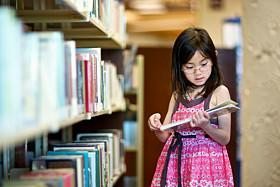BY SHARON MARTIN
How many books do you have in your house? Do you have a library card? Do your children have access to reading material during the summer months?
Why does it matter? Students who read know things. They build connections in their brains that connect to other things. The more one knows, the more one can know and the more one can construct new knowledge from bits and pieces of information.
Books help bridge the achievement gap between middle-class and low-income students. A recent study by the University of Tennessee-Knoxville found that giving low-income students 12 books of their choosing at the beginning of summer was as effective as summer school in preventing the summer slide.
According to long-term research, as much as 80% of the achievement gap between poorer and wealthier students can be attributed to lack of reading materials and education opportunities during the summer months.
Most middle class students have access to summer camps, vacations, and education programs. They have library cards and home libraries. Many low income students do not.
This results in a much-studied phenomenon known as the summer slide. Poor students return to school each fall behind their middle-class peers. By the end of high school, they are as much as three years behind.
Another study by the University of Nevada found that “children with as few as 25 books in the family household completed on average two more years of schooling than children raised in homes without any books.” Children from homes with more than 500 books were even more likely to complete college than students whose mothers were college educated.
Books are a powerful tool against ignorance and poverty, and too many children in Oklahoma live in a book desert. My hometown has no library and no book store. The last time I looked there were no children’s books available on the grocery store book rack. We need to address this lack of opportunity.
University of Tennessee’s 12-book study began in 17 high-poverty elementary schools in Florida. The books, chosen by the students, were purchased with Title I funds.
Because of the initial success of the program, it has expanded to schools in South Carolina and Georgia. More than 8,000 students in Chicago received books in 2010 thanks to a discount program from Scholastic Books.
Oklahoma students need their own summer-books program. Talk to the school superintendent and to school board members. If you are lucky enough to have a city library, talk to City Council members and ask that library funding be protected.
Meanwhile, we all must do what we can to get books into the hands of children during the summer months. Make books a priority. Let’s bridge that achievement gap.
– Sharon Martin lives in Oilton, OK and is a regular contributor to The Oklahoma Observer









Absoutely! Sharon Martin has nailed it! Furthermore, if a child has never taken a book OUTSIDE during the summertime and found a shade tree to sit under while they read, they simply do not know what memories that action will create in their minds later. If Americans do not understand that it is their DUTY to provide access to books for the poorest among us and a TREE, then we should not pretend we are good, caring citizens. It simply is not true. So, come on people……put your time, effort and funds toward those youngsters who will never know the joys of books without you! The rewards for our country’s future is immeasurable!!